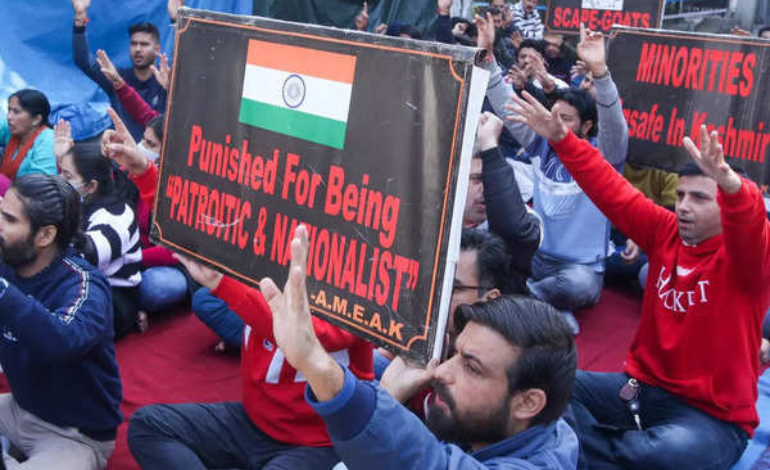
The Supreme Court has denied a curative appeal seeking reconsideration of its 2017 ruling dismissing a plea seeking a probe into the alleged mass murder of Kashmiri Pandits in the valley in 1989-1990. A three-judge panel led by Chief Justice D Y Chandrachud dismissed the petition, ruling that no case was made out.
"We have gone through the Curative Petition and the connected documents. In our opinion, no case is made out within the parameters indicated in the decision of this Court in Rupa Ashok Hurra vs Ashok Hurra. The Curative Petition is dismissed," the bench also comprising Justices S K Kaul and S A Nazeer said.
The curative petition, filed by the Kashmiri Pandit organisation "Roots in Kashmir," argued that the apex court was not justified in dismissing the writ petition at the admission stage in 2017 simply on the assumption that the instances referred to in it occurred between 1989 and 1990, and that no useful outcome would result because it is unlikely that evidence will be available at this late stage.
"This really amounts to failure of justice or gross miscarriage of justice caused to the petitioner in view of the fact that the petitioner has stated in the writ petition as well as in review petition that this court has not only entertained the writ petition and also passed necessary direction for trial etc. in cases where the incident pertains to even more than 30-32 years," the petition had said.
The highest court's curative petition, which is its final line of action, is often heard in chambers unless there is a compelling argument for the judgement being re-examined. In its original writ suit, the organisation had asked the Supreme Court to investigate and prosecute a number of people in connection with the murders of Kashmiri Pandits in 1989–1990, 1997, and 1998.
Along with other directives, it had also asked that the CBI, NIA, or any other agency designated by the supreme court take over the investigation of all FIRs and instances of murder and other related crimes against Kashmiri Pandits in the years 1989–1990, 1997, and 1998. In their petition, the organisation claimed that the Jammu and Kashmir Police had failed to make any progress on hundreds of FIRs that were waiting with them. In April 2017, the Supreme Court rejected the petition. It later rejected the review petition filed in the case. The organisation asked the Supreme Court to revisit its rulings in the curative petition.
The petition stated that communal peace is the hallmark of a democracy, that no religion teaches hatred, and that killing people in the name of religion is fundamentally a slur and blemish on the society ruled by the rule of law. The organisation alleged that hundreds of FIRs were waiting with them, but the Jammu and Kashmir Police had made no headway on them. According to the petitions submitted to the top court, a special investigation team (SIT) had been established to look into the cases related to the Godhra riots. According to the argument, the organisation had argued in the review petition that the court had taken cognizance of matters related to the 1984 anti-Sikh riots even after a gap of more than 33 years.
This court should intervene to prevent an excessive miscarriage of justice if the state's systems fail to safeguard a citizen's life, liberty, and property and the inquiry is carried out hastily to support the accused. According to the petition, the Supreme Court failed to recognise that over 700 Kashmiri Pandits were killed between 1989 and 1998, and that FIRs were filed in over 200 cases, but not a single FIR progressed to the point of filing a charge sheet or conviction.